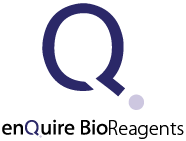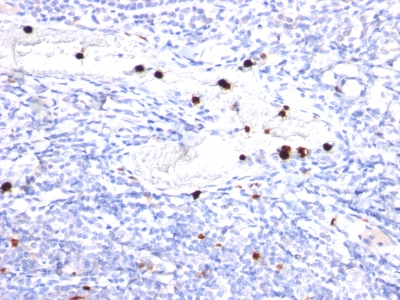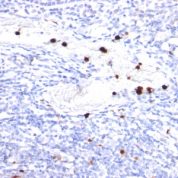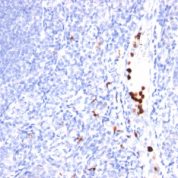Human and Macaque Monkey Anti-Granulocyte-Colony Stimulating Factor Antibody Product Attributes
Species: Human and Macaque Monkey
Tested Applications: Flow Cytometry, Immunofluorescence, Immunohistochemistry (IHC).
Application Notes: Flow Cytometry (0.5-1ug of antibody/million cells in 0.1ml), Immunofluorescence (1-2ug of antibody/ml), Immunohistochemistry (IHC) (Formalin-fixed) (0.5-1ug of antibody/ml for 30 minutes at RT)
Clonality: Monoclonal
Anti-Granulocyte-Colony Stimulating Factor Antibody Clone: CSF3/900
Clone CSF3/900 Host and Isotype: Mouse IgG1
Anti-Human and Macaque Monkey Granulocyte-Colony Stimulating Factor Positive Control Sample: HL60 cells. Tonsil or lymph node
Cellular Localization of Antibody Cytoplasmic
Buffer and Stabilizer: 10mM PBS with 0.05% BSA & 0.05% azide.
Antibody Concentration: 200ug/ml
Antibody Purification Method:Protein A/G Purified
Immunogen: Human recombinant full-length CSF3 protein
Storage Conditions: Store at 2 to 8° C (refrigerate). Stable for 24 months when properly stored.
Granulocyte-Colony Stimulating Factor Previously Observed Antibody Staining Patterns
Observed Antibody Staining Data By Tissue Type:
Variations in Granulocyte-Colony Stimulating Factor antibody staining intensity in immunohistochemistry on tissue sections are present across different anatomical locations. An intense signal was observed in exocrine glandular cells in the pancreas. More moderate antibody staining intensity was present in exocrine glandular cells in the pancreas. Low, but measureable presence of Granulocyte-Colony Stimulating Factor could be seen in cells in the endometrial stroma in endometrium, cells in the molecular layer in cerebellum, decidual cells in the placenta, germinal center cells in the tonsil, glandular cells in the adrenal gland, appendix, breast, gallbladder, parathyroid gland, prostate, rectum and thyroid gland, hematopoietic cells in the bone marrow, keratinocytes in skin, Langerhans in skin, Leydig cells in the testis, lymphoid tissue in appendix, macrophages in lung, neuronal cells in the caudate nucleus, cerebral cortex and hippocampus, ovarian stroma cells in the ovary, peripheral nerve/ganglion in colon, Purkinje cells in the cerebellum, respiratory epithelial cells in the bronchus and nasopharynx, squamous epithelial cells in the tonsil, trophoblastic cells in the placenta and urothelial cells in the urinary bladder. We were unable to detect Granulocyte-Colony Stimulating Factor in other tissues. Disease states, inflammation, and other physiological changes can have a substantial impact on antibody staining patterns. These measurements were all taken in tissues deemed normal or from patients without known disease.Observed Antibody Staining Data By Tissue Disease Status:
Tissues from cancer patients, for instance, have their own distinct pattern of Granulocyte-Colony Stimulating Factor expression as measured by anti-Granulocyte-Colony Stimulating Factor antibody immunohistochemical staining. The average level of expression by tumor is summarized in the table below. The variability row represents patient to patient variability in IHC staining.| Sample Type | breast cancer | carcinoid | cervical cancer | colorectal cancer | endometrial cancer | glioma | head and neck cancer | liver cancer | lung cancer | lymphoma | melanoma | ovarian cancer | pancreatic cancer | prostate cancer | renal cancer | skin cancer | stomach cancer | testicular cancer | thyroid cancer | urothelial cancer |
|---|---|---|---|---|---|---|---|---|---|---|---|---|---|---|---|---|---|---|---|---|
| Signal Intensity | ++ | ++ | - | + | - | - | - | + | - | - | - | - | + | + | ++ | - | + | - | - | + |
| CSF3 Variability | + | ++ | ++ | ++ | ++ | ++ | + | ++ | ++ | ++ | ++ | ++ | ++ | ++ | ++ | ++ | ++ | ++ | ++ | ++ |
Limitations and Warranty
enQuire Bio's Granulocyte-Colony Stimulating Factor Anti-Human Monoclonal is available for Research Use Only. This antibody is guaranteed to work for a period of two years when properly stored.






There are no reviews yet.